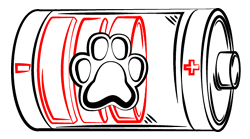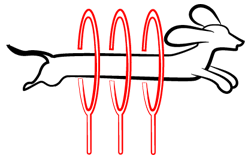
Paws ‘N’ Pups Quickview
Size
| Energy Level
| Trainability
| Paws ‘N’ Pups Rank
|
Characteristics
| Physical Characteristics: Height: 28-30” Weight: 80-130 lbs. Energy Level: Moderate | Colors: The Shiloh Shepherd is found in the following colors:
|
Health & Longevity
Average Life Span: 12-14 years
The Shiloh Shepherd is a hybrid between a German Shepherd, an Alaskan Malamute, and a few other breeds (although there is discrepancy on exact lineage). For this reason, the Shiloh Shepherd has inherited many health problems common to the German Shepherd.
Hip dysplasia and elbow dysplasia can plague some Shiloh Shepherds. Hip dysplasia, when the thighbone does not fit properly into the hip joint, cases discomfort, pain, and potentially arthritis. Dogs with hip dysplasia should not be bred, so ensure that your puppy’s parents have no history of the condition. Elbow dysplasia is caused by a malformed or weak joint and can lead to lameness in some cases. Treatment includes weight and health management, anti-inflammatory medication, and, in severe instances, surgery. Both conditions are degenerative, meaning they grow worse with time if untreated.
Bloat, also known as gastric torsion, is most common among large dog breeds, including the Shiloh Shepherd. Bloat occurs when an unusual amount of air, fluid, and/or foam accumulates in the stomach. Twisting of the stomach can also occur, resulting in blocked passageways and trapped gas and stomach content. Symptoms of bloat include gagging, shallow breathing, foamy saliva, and failed attempts to vomit. Bloat can be fatal, so if your dog exhibits these symptoms, he should be rushed to your veterinarian immediately. He will likely be treated with gastric decompression upon arrival.
GSD/IVA, a hereditary electrical issue in the heart that can potentially lead to sudden death for young dogs, may also impact some Shiloh Shepherds. GSD/IVA presents no symptoms, so it is important to test your Shiloh Shepherd for this condition when he is between 4 months and a year old. A 24-Hour Holter Monitor test is used to diagnose GSD/IVA, and it involves the attachment of electrodes to the dog’s chest.
Shiloh Shepherds may also experience Exocrine Pancreatic Insufficiency (EPI), which results in the inability to properly digest food. This condition can lead to complications such as malnutrition, chronic diarrhea, and weight loss. Treatment typically involves enzyme supplements, which come in powdered form and can simply be added to your dog’s food.
Other problems, such as skin conditions and tumors, may also affect Shiloh Shepherds. In general, this is still a fairly healthy breed with a life expectancy of 12-14 years.
Temperament & Train-ability
There are several Shiloh Shepherd Clubs, so the breed has diverged in different directions with regards to both appearance and temperament. Generally speaking, Shiloh Shepherds are excellent companions who are friendly, loyal, and love to be around their families. They are intelligent, calm, and relatively easygoing.
It is important for a Shiloh Shepherd to get plenty of exercise. He enjoys being outdoors and participating in activities such as swimming. He is not a speedy dog, but he has excellent stamina and may enjoy long walks or jogs. Although an apartment is not ideal for a Shiloh Shepherd, he can live an apartment if his owner is committed to taking him somewhere spacious to run and stretch his legs. A daily run or walk is a must. If the Shiloh Shepherd is merely walking, the walk should be long and fast-paced. If this breed is not properly exercised, he is likely to become restless and destructive, so be prepared for chewed shoes. The Shiloh Shepherd is extremely intelligent and does need both physical and mental stimulation in order to be happy and calm.
Although the Shiloh Shepherd should spend time outdoors daily, he prefers to be an inside dog who can spend large amounts of time with his family. If he does live outside, he needs adequate shelter from the elements. The gentle Shiloh Shepherd gets along well with children and the elderly, and the breed is often used for therapy. Shiloh Shepherds are typically friendly with dogs who live in the same household, but they may become aggressive with unknown dogs, particularly unknown dogs of the same sex.
Brave and confident, the Shiloh Shepherd makes an excellent watchdog and guard dog for his family. He is protective and loyal, and he will go to great lengths to protect the people he loves. He is also highly alert and likely to notice any sign of danger.
The intelligent Shiloh Shepherd genuinely enjoys being challenged and learning new skills, so he is not overly difficult to train. Do socialize and train your dog from an early age. Shiloh Shepherds who are not thoroughly socialized may become timid and skittish. When training, make it clear to your Shiloh Shepherd that you are in charge. Avoid initiating bad habits that will be difficult to correct later on by establishing clear, consistent rules and expectations. Use positive reinforcement like treats, praise, or outdoor playtime when earned.
Grooming
The Shiloh Shepherd’s coat can be either smooth or plush. The smooth coat requires less upkeep; the plush coat needs to be brushed more regularly. The Shiloh sheds quite a bit, and he experiences seasonal periods of heavy shed. During periods of heavy shed, a quick brushing once a day may be needed to keep loose hair at bay. Do not over bathe your Shiloh Shepherd, as you may dry out his skin. Bathe only as needed; many Shiloh Shepherd owners bathe their dogs just twice annually.
Check your dog’s ears regularly for signs of infection such as odor, tenderness, or redness. Clip nails to prevent overgrowth and breakage. In order to maintain healthy gums and keep bad breath at bay, brush your Shiloh Shepherd’s teeth at least once a week. Two to three times a week is even better.
Diet
A high quality, natural dog food is ideal for the Shiloh Shepherd. The exact amount of food your dog needs will vary according to factors such as age, gender, metabolism, activity level, and size. To prevent bloat, you must take a few precautions. Split food into several small meals daily. Wait at least one hour after eating before allowing exercise or strenuous activity for your dog. Do not allow him to eat too rapidly, and do not let him drink excessive amounts of water right before or right after eating.
Still, it is important to ensure that your Shiloh Shepherd always has access to clean, fresh drinking water.
Looking for a Shiloh Shepherd?
 Find A Shiloh Shepherd Breeder |  Shiloh Shepherd Puppies For Sale |  Adopt A Shiloh Shepherd |
Cost
The Shiloh Shepherd is a fairly rare breed and will likely cost you $1200-$2000. It can be difficult to find a reputable breeder for the Shiloh Shepherd, particularly because there are such divergent standards for the breed, so do your research carefully.
If you would like to adopt a Shiloh Shepherd, expect adoption fees to cost about $175.
Paws ‘N’ Pups Ranking
Paws ‘N’ Pups ranks every breed out of 4 with 1 being easiest to integrate into your life and 4 being the toughest – The lower the ranking the better.
Ranking takes into account a few basic factors including cost, skill level needed, high vs low maintenance and how critical regular training is to success. The Shiloh Shepherd ranks a 3. He is a gentle, loving breed who is good with children, the elderly, and most other dogs, and he is fairly easy to train. He can live indoors or outdoors, but adequate exercise is an absolute must. He has the potential for serious health problems, sheds quite a bit, and needs proper socialization to ensure he does not become timid or skittish.
Breeds Similar To Shiloh Shepherd
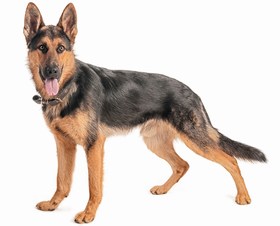 German Shepherd | 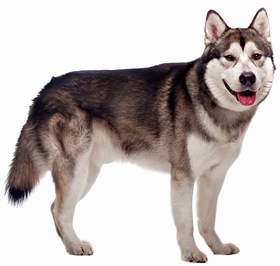 Alaskan Malamute | 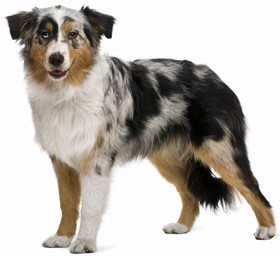 Australian Shepherd | 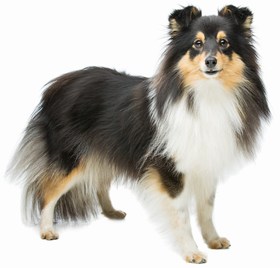 Shetland Sheepdog |


